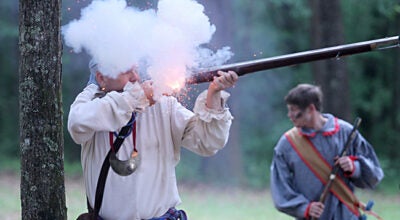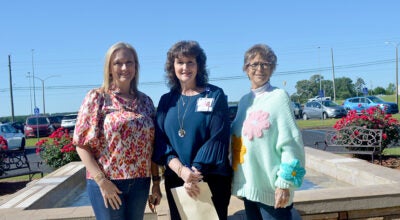Poultry litter turner demo at Motes’ farm
Published 7:03 pm Tuesday, June 29, 2010
Old habits are hard to break but, if area poultry farmers can shake loose, the results should be environmentally and economically beneficial.
That was the message gleaned from the onsite demonstration of a “Brown Bear” Poultry Litter Turner/Windrow Machine at the James and Elizabeth Motes farm on Tuesday morning.
The demonstration was sponsored by the Pike County Soil and Water Conservation District in an effort to make area poultry farmers aware of a relatively new and innovative way to increase their profit margins, improve the living conditions in the poultry houses and produce healthier birds.
“The turner windrows litter in the houses and those piles go through a heat with extremely high temperatures thus destroying diseases,” said Elizabeth Motes, chair Pike County Soil and Water Conservation District. “The litter is leveled out in the houses ready for the next flock.”
David Davis, Brown Bear regional manager, said that the poultry litter turner/windrow machine has been used successfully in north Alabama for about seven years.
“The process is simple,” he said. “The machine turns the litter from the bottom up, breaks up the cakes and puts the litter in windrows. The piling of the litter causes heat to build up, killing pathogens. After three days, you come back in and turn the litter again and then level the litter out.”
The litter can be used again and again and Davis said some growers have used the same litter for four years.
The replacement cost of a load of peanut hulls is $600 and a load of wood shavings can top $1,000. Reuse of the litter alone keeps money in the grower’s pocket.
Ray Hilburn, Alabama Department of Agriculture and Industries, said the benefits to the grower are compounded when one considers the resulting improved living conditions in the houses and healthier birds.
“This process kills the pathogens that are not destroyed by just turning the litter,” he said. “When the littler is put in windrows, the heat destroys pathogens. Back when we began to be able to control the temperature in the houses, we caused another problem by providing a cool, dark, damp place for pathogens. Take the Darkling beetle. They would surely rather be in a poultry house than out in the hot sun. They can’t take the heat. As soon as the litter is put in windrows, the heat will drive the beetles out so they can be sprayed and killed. The heat destroys the larvae, so the litter you spread is much more disease free. These beetles eat feed and can get in the insulation and even in the wood and do a lot of damage that way.”
The poultry litter turner/windrow machine also makes in unnecessary for growers to have to look for places to put the litter when the poultry houses are cleaned out.
“This process keeps a lot of litter out of the environment. It pasteurizes the bedding and helps with feed conversion,” said Tony Wood of Wayne Farms. “The birds just do better if they aren’t having to fight off diseases.”
Some of the poultry growers said they will be interested to see if the poultry litter turner/windrow machine will work for them and are willing to give it a try. Others aren’t sure they are ready to venture out into something new – just yet.
Frank Talbot stayed around after the demonstration to ask a few questions, an indication that he saw some value in the process. He said he could see the benefits but it’s a labor-intensive process and he will have to consider all aspects of the process before making a decision.
Ben Hicks, however, scheduled the poultry litter turner/windrow machine for “work” at his poultry farm in July.
“I had a lot of questions and what is seems to me is that the benefit is more in the line of increased production rather than cost savings,” Hicks said. “Some time back, I went to a meeting about this machine and heard some growers from north Alabama speak.
“So, I see the potential for improved production and there might be a savings along the way. But we’re not going to see the results of it immediately. It’s hard to change the old ways of doing things so this program is going to have to be developed. Right now, I’m just taking a wait and see approach. But, if we can grow healthier birds using it, then it will be a big benefit to the industry.”
Through an ADEM matching grant, the Pike County Soil and Water Conservation District has purchased a poultry litter turner/windrow machine that will hitch to any 40- to 65-horsepower tractor. The machine is available at no charge to local growers.
For more information about the poultry litter turner, contact the Pike County Soil and Water Conservation District at 334-566-2300 ext. 3.




